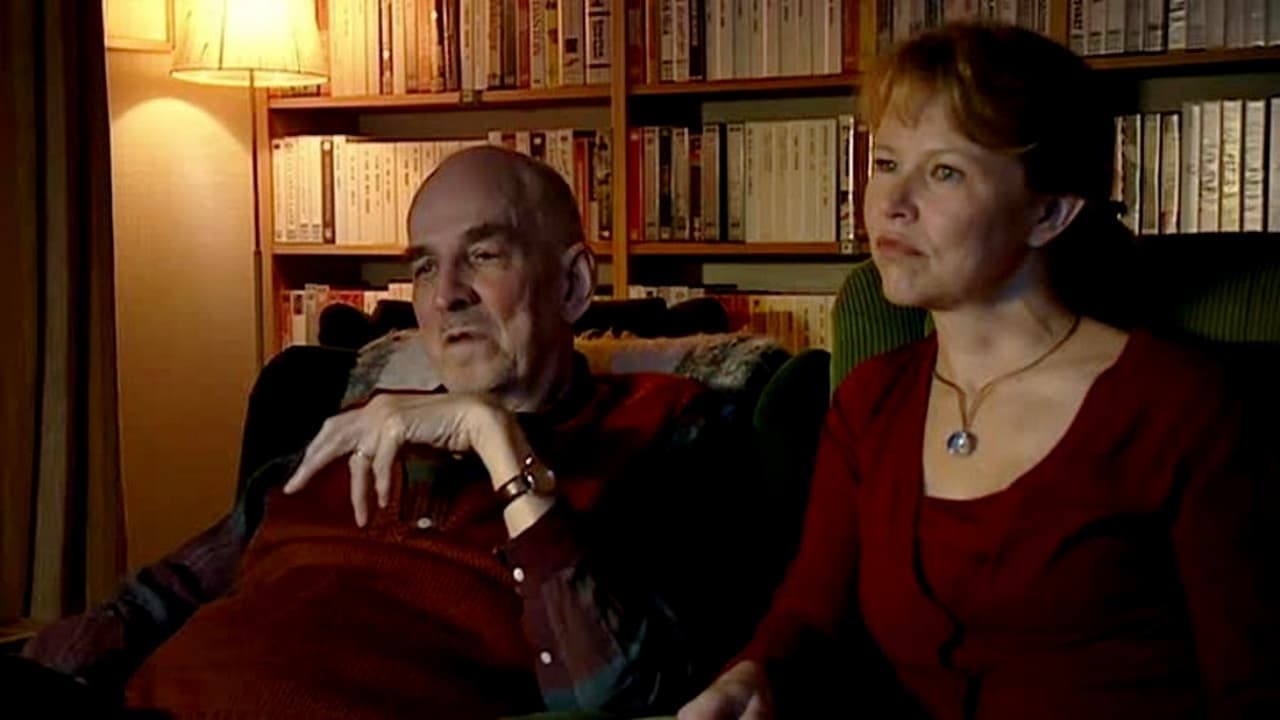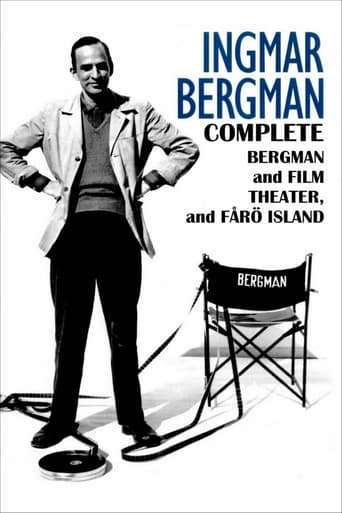PlatinumRead
Just so...so bad
MamaGravity
good back-story, and good acting
TeenzTen
An action-packed slog
Married Baby
Just intense enough to provide a much-needed diversion, just lightweight enough to make you forget about it soon after it’s over. It’s not exactly “good,” per se, but it does what it sets out to do in terms of putting us on edge, which makes it … successful?
drjgardner
I'm a big big fan of Bergman's films, especially his work in the 50s ("Seventh Seal", "Wild Strawberries", "The Magician") and early 60s ("Virgin Spring", "Through a Glass Darkly", "Persona"). Somewhere in the mid 60s his films lost their appeal to me and eventually I just stopped watching them. This documentary is more of a personal film about Bergman rather than a film about his films. If you're expecting to learn about the films per se you will be disappointed. If you want to learn about how many children he has, or his relationship with his parents, or how he likes to spend his day, then this is the film you're looking for.In retrospect, it's a bit like eating sausage and then talking to the butcher about his life and his career making sausage. As much as I used to enjoy eating sausage, the life of the butcher holds no real interest for me.
Cosmoeticadotcom
An odd thing occurred to me while watching The Criterion Collection's new release, Bergman Island. It was a feeling that this documentary was really a DVD extra rather than a feature. Then, lo and behold, whilst researching the disk online I found out that I was correct- that this film was indeed an Extra Feature on the company's latest re-release of another Bergman film, The Seventh Seal. And that includes its own extra feature- a half hour video essay on Bergman's filmic canon by film historian Peter Cowie. Having said that, Bergman Island is not a bad documentary, but it breaks no new ground; neither cinematically, in the way, say, a documentary like The Kid Stays In the Picture does, nor in revealing anything about Bergman unseen before- not his life, his views, nor his home. This is because Bergman did many interviews in his career, and many with Marie Nyrerod, this film's director. Additionally, this film has a further problem, and that is a slapdash feel to it. The interview tends to range all over the place, and this is due to the fact that the 83 minute film is really a condensation of three one hour long films that Nyrerod did with Bergman on his life and twin careers in theater and film. This cut, however, almost totally scraps the theater hour and focuses mostly on the personal hour, with about a third of it devoted to the films.What is left of the film goes over many of the subjects well trod in other interviews: Bergman's obsessions with sex and death, or his claim that guilt is somehow ostentatious, etc. While there is something honest but self-serving about hearing Bergman claim 'I had a bad conscience until I discovered that having a bad conscience about something so gravely serious as leaving your children is an affectation, a way of achieving a little suffering that can't for a moment be equal to the suffering you've caused. I haven't put an ounce of effort into my families. I never have,' one wishes that Nyrerod would have come back with a good follow up to such a claim. Instead, she lets Bergman off the hook. The best interviews are conducted eye-to-eye, but Nyrerod seems so awed to be in Bergman's presence that the old man runs roughshod over her, and consequently the whole film suffers from a lack of structural discipline and intellectual rigor. What would have worked better, filmically, is actually asking penetrating questions about the films and then tying them to the man's personal life. But, in this, Nyrerod seems almost in congenital genuflection to Bergman. She never seems interested in actually holding Bergman accountable for his views nor actions. Not that she needed to be Torquemada, but she need not have been a lapdog either. As for the DVD? I wish Criterion had included all three hours in the DVD package- thus differentiating it from the Special Features disk on the re-release of The Seventh Seal. One hopes they would have been more linear, coherent and incisive. Then, again, if the individual hours were edited to the same degree as the shorter film then, perhaps including only it was the reason the company released it as so.The thing about the film that is curious is, given Bergman's penchant for wildly bizarre opinions on the films of others (he rips on the work of Michelangelo Antonioni- whose aesthetic he shares much with, while praising the treacly schlock of Steven Spielberg, or he rips on the great films of Orson Welles and the dull, imitative tripe of Jean-Luc Godard with the same distaste, as if they were in the same league with each other), little is done in terms of opining about the art of film, save his own. He's simply not a born raconteur, the way a Werner Herzog is, so one wishes Nyrerod would have put more effort into bringing Bergman into areas he was uncomfortable with. Hagiography simply is not that entertaining. Also, while it might seem cool to show Bergman strolling about his home on Fårö island, in the Baltic Sea, it means little since rarely is the island and its geography shown to have been an influence on the man's films. Given the preponderance of the island's physical presence in the films Bergman released in the 1960s- certainly the equal of the Italian countrysides Antonioni used, it's curious that Nyrerod makes almost nothing of this in her film, save to have the director mouth the banality that he finds the island 'magical.'Overall, this is a DVD that the true Bergmaniac may find superfluous- indeed, if he has updated his DVD library with the latest version of The Seventh Seal this will literally be true; but even without having done that, there's little this DVD has to offer. Its real value is as an introduction to the works of Bergman; many titles of which are also available from Criterion. As such, and to this audience, I recommend this DVD, and even more so the 'extra' than the 'feature.' I said it was an odd thing.
peacecreep
Some of this material is on DVD extras of Bergman films. Here we have it all in one place. For a Bergman fan, this documentary is fascinating, for we see inside his home and hear about his daily life. Bergman is heavy, a serious and thoughtful artist reflecting on a life towards its end. He summarizes his feelings on death and religion. His wisdom is undeniable. Bergman fully admits his faults and openly discusses his creativity. Highlights are him trying to answer questions on Persona and a part about how scene three from Scenes from a Marriage is directly from his life. Overall, an important document for any serious fan of cinema.
MisterWhiplash
I have already seen several interviews, both short and long in length, with the legendary Swedish director Ingmar Bergman, but rarely has he ever been this revelatory in what he says to his interviewer/director of the film Marie Nyerod. In fact, I would go as far as saying that there are very few, if any, filmmakers or artists who say so much from an emotional core, from a place where feelings and experience touch one very greatly and profoundly and hurtingly at times, while still being able to be articulate and with a truly intellectual core. In other words, it's like watching one of his films, sort of. And interesting too is seeing how he lives on this island, from the (American-released) title 'Bergman Island', and how it suits him very well in his golden years. He first came to the island while filming Through a Glass Darkly, and decided to live there after filming Persona, as the island somehow spoke to him intensely and movingly with its tranquility and peace and, particularly, seclusion.But even when Nyerod finds Bergman at his home, widowed 8 years from his fifth and final wife Ingrid, he says that he does not even feel lonely, and for one who is as disorganized as him, rituals in the day are crucial for him. So he goes in this documentary on wonderful ruminations on his childhood, which held as many joys as terrors and very harsh circumstances of what 'love' meant with pain (this later went brilliantly and crushingly into Fanny & Alexander), on his early successes and the turning point that came in the mid 50s, on his passions for the theater and film and how they vary (as well as passions for the women of his life, and how he transitioned from wives to his female stars), and finally on the great fear of death and questioning of religion. Listening to him, as a fan, is like hearing someone who knows all there is to know in the world, but also through massive experience and what comes with working as a serious dramatist and storyteller and poet all of his life, there comes some pain and hurt and the knowledge that there can be cruelty that comes.Most fascinating of all, aside from hearing the little tid-bits of stories from his films- especially Scenes From a Marriage and episode 3 of that work, and Cries and Whispers and his way of lies with the press- is hearing him talk of what a 'bad conscience' means, and how death impacted him, particularly after the passing of his wife. Never does he close himself off from the interviewer, and one always gets the total sense of Bergman, even as he is sometimes not totally sure of himself completely, just like everyone out there. Leaving the movie, much as I might with a directed-Bergman film, my mind became intellectually sparked, and I too thought of such prescient matters like of the afterlife and of what it means to be creative or what demons many of us carry and may not even acknowledge (i.e. "the demon of nothingness"). In short, if you love Bergman, this sort of final coda in what will very likely be the last we'll see of Bergman on screen, is priceless. And if you're just getting into his work too it's worth a viewing. I especially would like to see the unedited version of this documentary, though printed on this site at 174 minutes was released here in the US at a meager (yet very meaningful and pleasant) 85 minutes.

